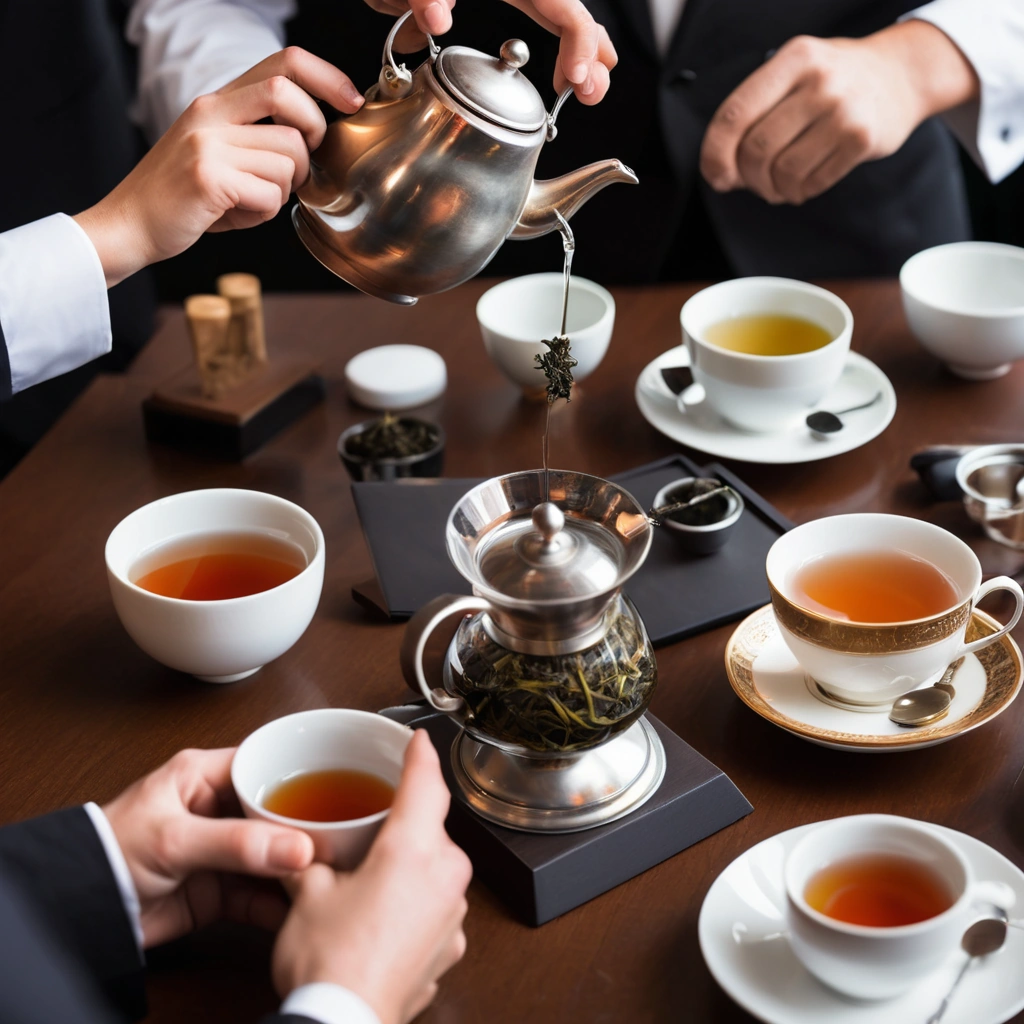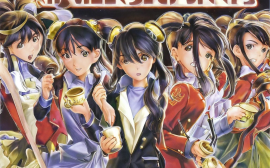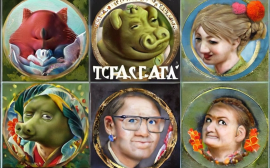Introduction: The Blossoming Career of a Tea Sommelier
The world of tea is experiencing a renaissance, a cultural and culinary awakening that elevates it far beyond the realm of simple refreshment. No longer relegated to dusty tea bags and hurried afternoon rituals, tea is being recognized for its complexity, nuance, and profound cultural significance. This resurgence has fostered a growing demand for experts who can navigate the intricate world of tea, understand its diverse origins, and appreciate its subtle flavors. At the forefront of this movement are tea sommeliers – professionals dedicated to the art and science of tea, acting as guides, educators, and curators of exceptional tea experiences.
They are the bridge between ancient traditions and modern palates, shaping how we understand and appreciate this remarkable beverage. But how does one ascend to the highest echelons of this profession? The tea sommelier career path requires a blend of passion, dedication, and continuous learning. It’s not merely about enjoying a cup of tea; it’s about understanding the intricate processes behind its creation, from the tea garden to the cup. This involves developing a deep knowledge of tea varieties, cultivation techniques, processing methods, and the art of tea tasting.
Furthermore, a successful tea sommelier must possess excellent communication skills to effectively share their knowledge and passion with others, whether through formal tea ceremonies, educational workshops, or personalized consultations. The journey to becoming a respected tea sommelier is a continuous process of refinement, exploration, and a commitment to elevating the tea experience for others. This guide provides a roadmap for aspiring and established tea sommeliers seeking to advance their careers, enhance their expertise, and carve out a successful niche in this burgeoning industry.
It delves into the essential aspects of career development, including the pursuit of advanced tea certifications, the cultivation of tea pairing expertise, and the understanding of tea business development. Whether you are a special education teacher abroad looking for a career change, or a seasoned professional seeking to deepen your knowledge, this article provides practical solutions and actionable strategies to help you navigate the exciting world of tea. Embrace the journey, cultivate your passion, and unlock the potential of a rewarding career as a tea sommelier.
Specialized Tea Certifications: Deepening Your Expertise
While introductory tea courses provide a foundation, specialized certifications are crucial for demonstrating advanced knowledge and skills, a necessity for any aspiring tea sommelier. Consider pursuing certifications focused on specific tea regions, such as Darjeeling, Uji (Japan), or Yunnan (China). These programs delve into the unique terroir, cultivation practices, and processing methods that define these regions’ teas, providing invaluable insights for tea business development and sourcing strategies. These certifications are a tangible demonstration of expertise, a key differentiator in a competitive tea sommelier career path.
Advanced tasting technique certifications are also invaluable for career development. These courses hone your ability to identify subtle flavor nuances, assess tea quality, and articulate your sensory experiences with precision. Look for certifications that incorporate blind tasting exercises and comparative analysis of different tea varieties. Mastering these techniques is vital for developing tea pairing expertise, a skill increasingly valued in fine dining and hospitality. The UK Tea Academy, the International Tea Masters Association, and the Specialty Tea Institute offer a range of advanced tea certifications.
Beyond regional and tasting expertise, consider certifications focused on specific tea types, such as pu-erh or matcha. These specialized programs offer in-depth knowledge of production methods, grading systems, and cultural significance. Furthermore, certifications in tea and health, or tea and sustainability, can enhance your marketability, aligning with growing consumer interest in these areas. Obtaining advanced tea certifications demonstrates a commitment to lifelong learning, a crucial attribute for any successful tea sommelier. For those interested in tea business, certifications in tea blending and product development can be particularly beneficial. These programs provide the skills to create unique tea blends, design innovative tea products, and understand the market dynamics of the tea industry. Moreover, understanding tea grading and quality control is essential for sourcing high-quality teas and ensuring customer satisfaction. Investing in tea education is an investment in your future as a tea sommelier, opening doors to new opportunities and enhancing your earning potential.
Building Your Professional Network: Connecting with the Tea Community
Building a strong professional network is essential for career advancement. Attend industry events such as tea festivals, trade shows, and conferences. These gatherings provide opportunities to connect with tea producers, importers, retailers, and fellow sommeliers. Joining relevant associations, such as the Tea Association of the U.S.A. or the World Tea Expo, can also expand your network and provide access to valuable resources. Don’t underestimate the power of online networking. Engage in tea-related forums, social media groups, and LinkedIn communities.
Share your knowledge, ask questions, and participate in discussions to build your reputation and connect with potential collaborators. Consider attending events like Afternoon Tea Week (celebrated in the UK, see Muddy Stilettos’ Essex Afternoon Tea Guide for inspiration) to network with local businesses. For those serious about their tea sommelier career path, actively seeking mentorship opportunities can prove invaluable. Connect with established tea sommeliers, tea educators, or tea business owners who can provide guidance and support as you navigate your career development.
Mentorship can offer insights into advanced tea certifications, tea pairing expertise, and tea business development strategies, accelerating your growth within the industry. Furthermore, attending workshops and seminars led by experienced professionals provides concentrated learning and networking opportunities, often leading to lasting connections. These interactions can be crucial in unlocking new possibilities for tea sommeliers. Cultivating relationships with individuals across the tea supply chain is also paramount for tea business acumen. Attend origin trips to tea-growing regions to meet farmers and understand the nuances of tea production firsthand.
These experiences provide a deeper appreciation for the complexities of tea cultivation and processing, enriching your tea education and enabling you to speak authoritatively about the origin and quality of different teas. Building direct relationships with producers can also open doors to sourcing unique and high-quality teas for your own tea business ventures. This direct engagement is a cornerstone of building a strong foundation in the tea business. Actively participating in tea competitions and judging panels offers another avenue for expanding your network and gaining recognition within the tea community.
Volunteering at tea-related events can also provide valuable exposure and networking opportunities. As you build your tea pairing expertise, consider collaborating with chefs and restaurants to host tea-pairing dinners or workshops. These collaborations not only showcase your skills but also introduce tea to a wider audience, further solidifying your position as a respected tea sommelier. Networking, therefore, is not just about collecting contacts; it’s about building genuine relationships that foster collaboration and mutual growth in the dynamic world of tea.
Developing Tea Pairing Expertise: A Culinary Symphony
Tea pairing is an increasingly sought-after skill for tea sommeliers. Developing expertise in pairing tea with food, chocolate, cheese, and other culinary delights can set you apart and open up new career opportunities. Experiment with different tea varieties and food pairings to discover complementary and contrasting flavor profiles. Consider taking courses or workshops on tea and food pairing. Many culinary schools and tea organizations offer specialized programs. Explore the principles of flavor chemistry and learn how to identify the key flavor compounds in tea and food.
Consider how the tannins, acidity, and sweetness of tea interact with different ingredients. The luxurious afternoon tea experiences in Dubai, as highlighted in ‘A guide to Dubai’s best afternoon tea experiences’, offer excellent examples of sophisticated tea pairings. Mastering tea pairing expertise is a critical step in the tea sommelier career path. It requires a deep understanding of both tea and culinary arts. Beyond simply identifying pleasant combinations, a skilled tea sommelier understands how tea can enhance, contrast, or cleanse the palate in relation to specific dishes.
For example, a robust Assam tea, with its malty notes, can beautifully complement a rich chocolate dessert, while a delicate green tea might be the perfect counterpoint to a spicy Asian dish. Advanced tea certifications often include modules dedicated to tea and food pairing, providing structured learning and practical experience in this specialized area. To truly excel in tea pairing, aspiring tea sommeliers should delve into the science behind flavor interactions. Understanding concepts like aroma compounds, taste receptors, and the impact of texture is crucial.
For instance, the astringency of certain teas, caused by tannins, can cut through the richness of fatty foods, creating a balanced and enjoyable experience. Similarly, the umami notes in some Japanese green teas can enhance the savory flavors of certain cheeses. This knowledge is invaluable for creating innovative and memorable tea pairing experiences, setting a tea sommelier apart in a competitive market. Developing this skill is essential for tea business development, enabling you to offer unique and sought-after experiences.
Furthermore, successful tea pairing goes beyond simply matching flavors; it’s about creating a holistic sensory experience. Consider the cultural context of both the tea and the food, as well as the overall ambiance of the setting. A formal tea ceremony might call for delicate pairings that emphasize subtlety and refinement, while a casual afternoon tea could feature bolder, more adventurous combinations. By understanding these nuances, tea sommeliers can create truly memorable and impactful experiences for their clients, enhancing their career development and solidifying their reputation as experts in the field. Continual tea education and experimentation are vital to staying at the forefront of this evolving area of tea sommelier expertise. This also contributes to the overall growth of the tea business.
Creating and Leading Tea Ceremonies and Workshops: Sharing the Art of Tea
Creating and leading tea ceremonies and workshops is an excellent avenue to share your profound tea knowledge, engage directly with tea enthusiasts, and generate income, all vital components of a thriving tea sommelier career path. Develop a diverse repertoire of tea ceremonies that meticulously showcase different tea traditions and brewing techniques from around the globe, highlighting the cultural significance and unique characteristics of each. For example, you could offer a traditional Japanese Chanoyu ceremony, demonstrating the precise movements and spiritual essence of this practice, or a Taiwanese Gongfu tea ceremony, emphasizing the art of brewing and appreciating oolong teas.
These immersive experiences not only educate participants but also solidify your expertise as a tea sommelier. Design workshops that cover a spectrum of topics, from introductory tea tasting sessions to advanced tea blending seminars and specialized tea and food pairing experiences. A tea tasting workshop could guide participants through the nuances of different tea types – white, green, oolong, black, and pu-erh – teaching them how to evaluate aroma, flavor, and body. A tea blending workshop could explore the art of creating custom tea blends, incorporating herbs, spices, and flowers to achieve unique flavor profiles.
Furthermore, workshops focused on tea pairing expertise, such as pairing teas with chocolate or cheese, demonstrate a high level of culinary understanding, a sought-after skill in the tea business. These educational offerings position you as a knowledgeable and versatile tea professional. Effectively marketing your ceremonies and workshops is crucial for success. Utilize online platforms, such as your website and specialized event listing sites, to reach a wider audience. Leverage social media platforms like Instagram and Facebook to showcase visually appealing content related to your events, including photos of tea preparations, tasting notes, and participant testimonials.
Partnering with local community organizations, tea shops, restaurants, and event venues can provide valuable exposure and access to new clientele. Consider offering introductory workshops at a local culinary school or collaborating with a restaurant to create a special tea-pairing menu. Tailor your offerings to different audiences, from beginners eager to learn the basics of tea to experienced tea drinkers seeking advanced knowledge. Remember to emphasize the immersive and educational aspects of your events, creating lasting impressions that solidify your reputation as a leading tea sommelier. Consider the evolution of Japanese Tea Ceremony, and remember to practice proper etiquette, seasonal considerations, and modern adaptations to stay relevant. This ensures you are providing an authentic and engaging experience that respects tradition while catering to contemporary tastes, a key factor in tea business development.
Understanding Tea Business Management: From Sourcing to Sales
A successful tea sommelier needs a solid understanding of tea business management to truly flourish along their tea sommelier career path. This extends beyond simply knowing tea; it encompasses the practical aspects of sourcing, pricing, and marketing. For instance, a deep understanding of cost accounting is crucial for accurately pricing tea selections and services, ensuring profitability while remaining competitive. Pricing strategy should factor in not only the cost of goods but also the perceived value of the tea, the sommelier’s expertise, and the overall market conditions.
Consider the example of a rare, aged pu-erh tea; its price reflects not just the raw materials but also the aging process, scarcity, and the story behind it. A tea sommelier with tea business acumen can effectively communicate this value to customers. Understanding tea business development also requires a keen awareness of the global tea market. Learn about the nuances of different tea-growing regions, from the high-altitude gardens of Darjeeling to the misty slopes of Uji, Japan.
Factors such as climate, soil composition, and cultivation techniques significantly influence tea quality and flavor profiles. Developing relationships with tea producers and importers is essential for securing access to unique and exceptional teas, providing a competitive edge. These relationships allow for direct sourcing, ensuring quality control and potentially negotiating better prices. Furthermore, staying informed about sustainable and ethical sourcing practices is increasingly important for attracting conscious consumers. A well-crafted marketing plan is vital for reaching your ideal customers and establishing your brand as a tea sommelier.
This plan should encompass both online and offline strategies. Leverage digital platforms such as websites, social media, and email marketing to showcase your expertise, share engaging content, and build a loyal following. Consider offering online tea tastings and consultations to expand your reach beyond geographical limitations, a key aspect of tea sommelier career path in the modern world. Offline strategies may include hosting tea workshops, partnering with local restaurants for tea pairing events (integrating tea pairing expertise), and participating in industry trade shows.
Staying updated on the latest trends in the tea industry, from innovative brewing techniques to emerging tea varieties, and adapting your business accordingly is crucial for long-term success. Investing in advanced tea certifications can also significantly enhance your credibility and attract discerning clients. Effective tea business management also involves understanding legal and regulatory requirements. This includes ensuring compliance with food safety standards, labeling regulations, and import/export laws. Navigating these complexities requires attention to detail and a proactive approach to staying informed about changes in legislation. For example, understanding the specific regulations regarding organic certification or fair-trade labeling can be essential for building trust with consumers who prioritize these values. Furthermore, a strong understanding of contract law can be invaluable when negotiating agreements with suppliers, distributors, and other business partners. By mastering these aspects of tea business, a tea sommelier can build a sustainable and thriving career.
Leveraging Digital Platforms: Building Your Brand Online
In today’s digital age, leveraging online platforms is crucial for personal branding and client acquisition along the tea sommelier career path. A professional website or blog serves as a digital portfolio, showcasing your expertise through detailed tasting notes, articles on tea origins, and captivating visuals of tea ceremonies you’ve conducted. High-quality content not only demonstrates your passion but also establishes credibility within the tea community. Consider featuring client testimonials and detailed descriptions of your services, whether it’s private tea tastings, corporate tea education workshops, or tea pairing expertise for restaurants.
Furthermore, ensure your website is mobile-friendly and optimized for search engines, making it easier for potential clients to discover you. Social media platforms offer unparalleled opportunities for engagement and promotion. Instagram, with its visual focus, is perfect for sharing aesthetically pleasing photos of tea preparations, tea ware collections, and food pairings. Use relevant hashtags such as #teasommelier, #teaeducation, and #teapairing to expand your reach. Facebook and LinkedIn can be used to share articles, announce events, and connect with other professionals in the tea industry.
Video content, particularly on YouTube, is highly effective for demonstrating tea brewing techniques, conducting virtual tea tastings, and offering behind-the-scenes glimpses into your tea business development. Consistency is key; regularly posting engaging content will keep your audience interested and attract new followers. Building an email list is essential for nurturing relationships and promoting your offerings. Offer a free e-book on tea basics, a guide to tea pairing, or a discount on your services in exchange for email sign-ups.
Use your email list to announce upcoming workshops, share exclusive content, and provide personalized recommendations. Platforms like Mailchimp and ConvertKit offer tools to automate your email marketing efforts and track your results. Consider segmenting your audience based on their interests and preferences to deliver more targeted content. By providing valuable content and exclusive offers, you can build a loyal following and drive conversions for your tea business. Drawing inspiration from successful models in related industries, explore how subscription services could be adapted to the tea world, offering curated tea selections or exclusive access to tea education resources.
Finally, actively participate in online tea communities and forums. Share your knowledge, answer questions, and engage in discussions. This not only establishes you as a thought leader but also provides valuable insights into the needs and interests of your target audience. Consider creating online courses or webinars to reach a wider audience and generate passive income. By building a strong online presence, you can expand your reach beyond your local community and attract clients from around the world, solidifying your position as a respected tea sommelier.



